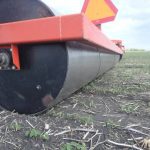In relation to time spent on production, farmers in Canada spend very little time actually marketing their crops and even less time seeking out brokerage firms that will guide them. But with the impending end of the Canadian Wheat Board monopoly on wheat and barley in 2012, more farmers may be looking for a broker to handle their risk management through futures accounts.
Farmers planning such a move need to do their homework, say some experienced market participants.
“Research and education for the farmer will be paramount,” said Ron Frost, with Frost Forecast Consulting in Calgary, Alberta, who runs a farmer-advisory service as well as providing training on the use of futures and options markets.
Read Also

Trade uncertainty, tariffs weigh on Canadian beef sector as market access shifts
Manitoba’s beef cattle producers heard more about the growing uncertainty they face as U.S. tariffs, and shifting trade opportunities, reshape their market.
Frost says only a small percentage of farmers presently uses the futures or options market as a hedging tool, although the younger generation of growers is showing a strong interest.
“One has to remember that although the majority of farmers in Western Canada have grown canola, as the crop has grown in prominence over the past decade, very few turn to the options or futures market,” Frost said. “When you add wheat, durum and barley into the mix, the percentage of farmers using the market will likely grow, but overall the numbers will remain minimal.”
Frost said the growers who will seek out brokers want the flexibility to handle their crops themselves.
The removal of the CWB’s monopoly powers will affect the whole marketing structure within the Canadian Prairies and will simply be another step in farmers taking more control of their own destiny, Frost said.
He said there will be growers who embrace this choice and there will be others that this is not what they are looking for. These individuals want a less hands-on approach to marketing and are satisfied with an averaged price for their work when marketed through an agency such as the CWB.
There is also no doubt that the boardrooms of all the large grain companies have been extremely active preparing for this change.
“Discussions, I am sure, have been ongoing about what additional marketing structures and programs these companies can put out there in order to entice the farm population to use their services given this new trading environment,” Frost said. “This is going to be one more incentive to have a brokerage account.”
TALK TO OTHERS
“There was certainly a time when the first item of business for a farmer was to look for a grain company that had outlets dedicated directly to catering to the growers,” said Ken Ball, a broker with Union Securities Ltd. in Winnipeg. “Back in the day, all the grain companies had brokerage divisions, including Alberta Wheat Pool, Saskatchewan Wheat Pool, Manitoba Pool Elevators and Uni ted Grain Growers.”
Many of those brokers remain in the market, Ball said.
He said farmers looking to find a broker should also take time to investigate the provincial government agricultural sites on the Internet, as some have a list of brokers who are available and will work with the farmer.
Local coffee shops may also be a place to talk to other farmers who have used a broker.
“Certainly an individual looking to find a brokerage firm can start the process by looking it up on Google, but there is also the opportunity to learn from the few growers who have used brokerage firms and are willing to talk about them at those coffee shops,” Ball said.
Frost said choosing a broker will likely be the most difficult step the farmer will have to take.
“I think the most important need of the farmer will be to find a broker he has an excellent rapport with.”
Frost said the reality of the situation is that a broker can give the same advice to 20 different farmers, with six ending up losing money, six who make money, six who break even and two who do either extremely well or poorly.
“It’s a combination of the risk tolerance of those growers and the way they interpret the data that is available. However, what it comes down to, is that every business relationship needs to be developed.”
He added that if there is a question farmers ask him frequently, it’s which broker to use?
“I give these growers a list of brokers’ names to consider as well as inform them that they need to talk to these brokers,” Frost said, noting that a grower needs to get a sense, or at least a feel, of how these brokers work and operate, the information they give, and whether the farmer thinks that this individual will be of benefit to the way the grower views marketing.
BE CAREFUL ONLINE
The choosing of a broker is definitely a process and not just a matter of picking up a phone and taking a chance.
“Farmers also would be advised not to just open up an online brokerage account where the individual does everything themselves,” Frost added, again pointing out that these growers need to learn and understand the process so it does not become an expensive proposition.
Manitoba farmer Bill Craddock currently trades online for himself, but he says it’s not for everyone. His resumé also includes former University of Manitoba professor, former president of the Winnipeg Commodity Exchange and former independent grain trader on the WCE floor.
“I would suggest that the No. 1 thing a farmer has to look at when choosing to use a broker or not is to first take a look at what the grain companies can put together,” Craddock said.
He said that while the grower may be locked into a deferred delivery contract and may not be able to get out of the deal easily, the benefit is that the farmer will not be getting a call if margin money is increased.
Craddock said that in some cases, the problem with doing it yourself through a broker is the tendency to start trading the market.
“In choosing a broker, the farmer needs someone who understands that you are hedging and you are not coming in to be a speculator,” Craddock said.
The farmer will need a firm that is willing to deal specifically with growers, he said.
“I don’t want to be negative toward any group of brokers, but some brokerage corporations don’t necessarily have a great track record,” Craddock said.
Some of the brokerage firms really do not want to babysit the farmer, and would rather see the individual trade regularly, Craddock added.
“For a farmer to put on a couple of hundred tonnes of grain in a position and wants to let it sit for a couple of months, the position does not really do much for that broker, particularly if the farmer is calling in every second day, asking ‘what do you think?’”
thinkstock
Frost agreed that not all brokerage firms want to deal with farmers as they don’t get paid to educate.
“The best advice I can give to any farmer looking for a broker, is ‘do not be afraid.’ You are the client. Do not be afraid to ask the broker questions, including how do they handle different situations when there is dramatic news impacting prices… what are their policies… how do they handle those types of situations from a hedging perspective,” Frost said.
Futures broker
———
“Ithinkthemostimportantneedofthefarmerwillbe tofindabrokerhehasanexcellentrapportwith.”
– ken ball, union securities














